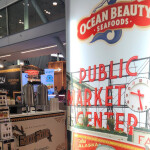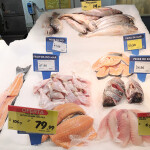Nine months ago, the U.K.’s Sunday Times famously claimed fewer than 100 mature cod were left in the North Sea. Fortunately, the report was well wide of the truth. Since a historical low in 2006, North Sea cod stocks have actually grown every year for the past seven years.
International Council for the Exploration of the Sea (ICES) figures show the spawning stock of North Sea cod increased by 250 percent between 2006 and 2012 and could soon reach the minimum desired level of 70,000 metric tons (MT) for the first time since 1998. This turnaround has been achieved through a series of fishermen/scientist collaborations that have delivered better, more robust evidence upon which effective fisheries management decisions have been made in recent years.
As SeafoodSource reported last week, it’s feasible the fishery could achieve Marine Stewardship Council (MSC) certification within two or three years if it continues on its current recovery trajectory. From a sustainability perspective, this is excellent news and should be universally applauded, not least because it endorses the tough management measures that have been implemented. But looking at the situation from a commercial point of view, there could be problems establishing a viable market for increased volumes of U.K. cod in the current consumer climate.
Over the past decade, the U.K. population has adopted the very black and white “don’t eat cod — it’s endangered” mindset. I have heard many a nervous order placed for the species at my local fish and chip shop on a Friday evening, for example. But it’s not just the man on the street that’s in the dark; conversations with suppliers suggest a similar problem exists with professional chefs.
One recently told me he had been trying to push greater volumes of fresh MSC-certified Norwegian cod to some of his clients in light of excellent availability and the attractive price. As much as the chefs liked working with the product and appreciated the quality, they were worried by their customers’ potential reaction to putting more cod on their menus and so in most cases decided on another species.
Getting U.K. cod back on U.K. menus is likely to require considerable consumer communication; perhaps it will warrant a national “Buy British Cod” campaign as the concept of buying local is very much in the ascendance, thanks in no small part to the recent horsemeat scandal.
According to a new study conducted by IGD ShopperVista, U.K. shoppers are now one-and-a–half times more likely to buy British than they were six years ago. The retail analyst also found the biggest shift came in the 18 to 24-year-old demographic, where more than two-thirds opt for domestically-produced groceries, compared to 36 percent six years ago. Furthermore, 78 percent of those people surveyed said U.K. farmers deserve the “full support of the British public.”
“The good news for British producers is that interest in food sourced in this country has never been higher,” said Joanne Denney-Finch, IDG’s CEO.
The country’s seafood industry should be looking to capitalize on this trend where it can. The increased interest in provenance could certainly help the country’s whitefish sector with its cod conundrum; it might also contribute to lifting prices, which is another big concern for fishermen. The abundance of cod in the market, brought about by incredibly high catch limits in both the Norwegian and Icelandic cod fisheries, has seen prices on the quayside fall to levels not seen for many years.
In the short-term, the low price trend is likely to continue. Iceland’s Marine Research Institute (MRI) recently recommended the total allowable catch (TAC) for cod in the 2013/2014 season that will get underway in the fall should be raised 10 percent to 215,000 MT. At the same time, it’s believed ICES will recommend a small increase in the Barents Sea’s current 1 million MT cod TAC for 2014.
So as North Sea cod stocks continue along the road to sustainability, so comes the urgency for marketers to devise a consumer-facing strategy that ensures the comeback is met with strong, widespread market demand.






